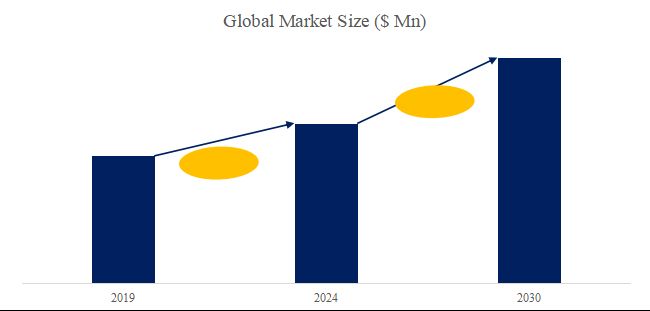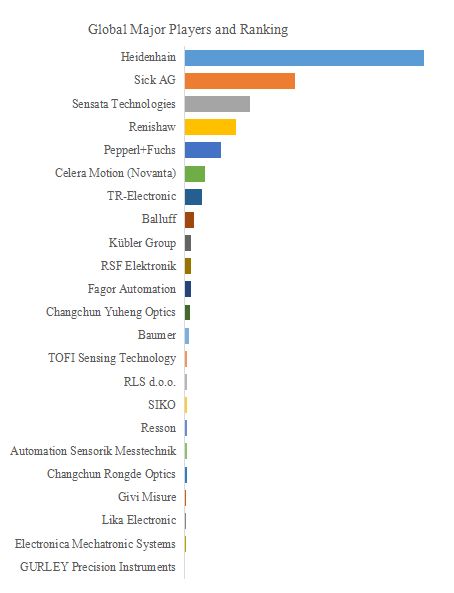Linear Encoders Industry Research:the global market size is projected to reach USD 1.65 billion by 2030
Linear encoder is a sensor device used to measure the position and motion of an object, which is commonly used in industrial automation and robot control systems. Its main principle is to use internal sensors to monitor the position of the target object relative to the encoder and convert the position information into a digital signal output.
Principle of operation: A linear encoder usually consists of two main parts: the encoder head and the readhead. The encoder head is fixed to a moving object, while the readhead is relatively stationary and mounted in a fixed position. The encoder head contains a grating or magnetic stripe inside the encoder head, while the readhead contains sensors to detect changes in the grating or magnetic stripe. As the object moves, the grating or magnetic stripe changes relative to the readhead and the sensor converts these changes into a digital signal to indicate the position of the object.
According to the new market research report “Linear Encoders- Global Market Share and Ranking, Overall Sales and Demand Forecast 2024-2030”, published by QYResearch, the global Linear Encoders market size is projected to reach USD 1.65 billion by 2030, at a CAGR of 6.2% during the forecast period.
- Global Linear Encoders MarketSize(US$ Million), 2019-2030

Source: QYResearch, "Linear Encoders- Global Market Share and Ranking, Overall Sales and Demand Forecast 2024-2030”
Features:
High accuracy: Linear encoders are able to provide very high position measurement accuracy, typically on the scale of microns or even smaller. High speed: thanks to digital signal processing, linear encoders enable fast position detection and response for high-speed motion applications.
Reliability: Linear encoders typically have a long service life and stable performance, and are able to operate in harsh environments.
Non-contact: In contrast to traditional contact position sensors, linear encoders are non-contact measuring devices and therefore do not suffer from friction or wear and tear that can affect measurement accuracy.
Linear encoders play an important role in industrial applications, enabling position measurement with high accuracy, speed and reliability, thus providing key technical support for automated production and robot control.
- Global Linear Encoders Top23Players Ranking and Market Share (Ranking is based on the revenue of 2023, continually updated)

Source: QYResearch, "Linear Encoders- Global Market Share and Ranking, Overall Sales and Demand Forecast 2024-2030”
According to QYResearch Top Players Research Center, the global key manufacturers of Linear Encoders include Heidenhain, Sick AG, Sensata Technologies, Renishaw, Pepperl+Fuchs, Celera Motion (Novanta), TR-Electronic, Balluff, Kübler Group, RSF Elektronik, etc. In 2023, the global top 10 players had a share approximately 66.0% in terms of revenue.
Product Type: Linear encoder product types mainly include incremental linear encoders and absolute linear encoders. Among them, incremental linear encoders are in high demand due to their cost-effectiveness and easy installation. currently Incremental Linear Encoders is the largest segment, hold a share of 60.2%.
In terms of product application, currently Machine Tools and CNC Machining is the largest segment, hold a share of 33.4%.
Main Applications:
Machine tools and machining equipment: linear encoders are commonly used in CNC machine tools and other machining equipment to accurately measure the position and motion trajectory of workpieces, thus realizing high-precision machining.
Robotic systems: In industrial robots and automation systems, linear encoders are used to determine the position of the robot's end-effector for precise motion control and path planning.
Manufacturing and assembly: Linear encoders are used to monitor the position of parts and assemblies on production lines to ensure accuracy and consistency in the assembly process.
Market growth driver:
Industrial automation: With the promotion of industrial automation and smart manufacturing, the application of linear encoders in machinery manufacturing and automation equipment will continue to grow.
Emerging markets: The Asia-Pacific region, especially China, Japan, South Korea, India and Southeast Asia, has great market potential and is expected to be an important driver of future market growth.
Industry Policies: National policies to support high-end manufacturing, such as Made in China 2025, will boost the linear encoder market.
Challenges: Challenges faced by the linear encoder market mainly include fierce price competition, challenges posed by technological upgrades, and the impact of global economic fluctuations on the industry.
Overall, the linear encoder market is promising and is expected to continue to grow steadily in the coming years as technology continues to advance and applications expand.
About The Authors
|
|
Bin Song - The main analyst of this article |
|
Email: SongBin@qyresearch.com
|
|
|
Mr. Song has 10 years of industry research experience, focusing on the research of electronics and semiconductors and other related fields, including semiconductor equipment and components, semiconductor materials, consumer electronics, new materials, etc. |
About QYResearch
QYResearch founded in California, USA in 2007.It is a leading global market research and consulting company. With over 17 years’ experience and professional research team in various cities over the world QY Research focuses on management consulting, database and seminar services, IPO consulting (data is widely cited in prospectuses, annual reports and presentations), industry chain research and customized research to help our clients in providing non-linear revenue model and make them successful. We are globally recognized for our expansive portfolio of services, good corporate citizenship, and our strong commitment to sustainability. Up to now, we have cooperated with more than 60,000 clients across five continents. Let’s work closely with you and build a bold and better future.
QYResearch is a world-renowned large-scale consulting company. The industry covers various high-tech industry chain market segments, spanning the semiconductor industry chain (semiconductor equipment and parts, semiconductor materials, ICs, Foundry, packaging and testing, discrete devices, sensors, optoelectronic devices), photovoltaic industry chain (equipment, cells, modules, auxiliary material brackets, inverters, power station terminals), new energy automobile industry chain (batteries and materials, auto parts, batteries, motors, electronic control, automotive semiconductors, etc.), communication industry chain (communication system equipment, terminal equipment, electronic components, RF front-end, optical modules, 4G/5G/6G, broadband, IoT, digital economy, AI), advanced materials industry Chain (metal materials, polymer materials, ceramic materials, nano materials, etc.), machinery manufacturing industry chain (CNC machine tools, construction machinery, electrical machinery, 3C automation, industrial robots, lasers, industrial control, drones), food, beverages and pharmaceuticals, medical equipment, agriculture, etc.
Contact Us:
If you have any queries regarding this report or if you would like further information, please contact us:
QY Research Inc.
Add: 17890 Castleton Street Suite 369 City of Industry CA 91748 United States
E-mail: global@qyresearch.com
Tel: 001-626-842-1666(US) 0086-133 1872 9947(CN)
EN: https://www.qyresearch.com
JP: https://www.qyresearch.co.jp

English
Simon Lee

English
Hitesh

Chinese
Damon

Japanese
Tang Xin

Korean
Sung-Bin Yoon
Competition
Key players, new entrants,acquisitions, mergers and expansions,development trends and challenges.
Industry Analysis
Rawmaterial, application, product type, demand,supply,downstream, supply chain etc.
Market Size
Capacity, production, sales, revenue, price, cost etc.
Customized Information
We can offer customized survey and information to meet ourclient's need.